Attached files
| file | filename |
|---|---|
| 8-K - 8-K - ESSENDANT INC | esnd-8k_20161026.htm |
| EX-99.1 - EX-99.1 - ESSENDANT INC | esnd-ex991_7.htm |
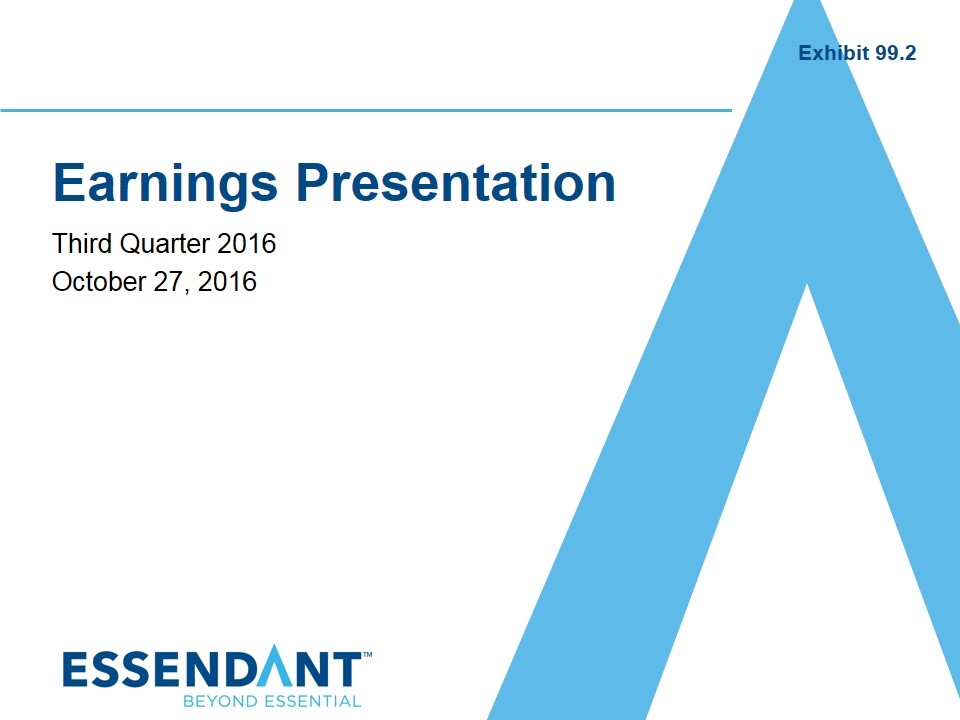
Earnings Presentation Third Quarter 2016 October 27, 2016 Exhibit 99.2
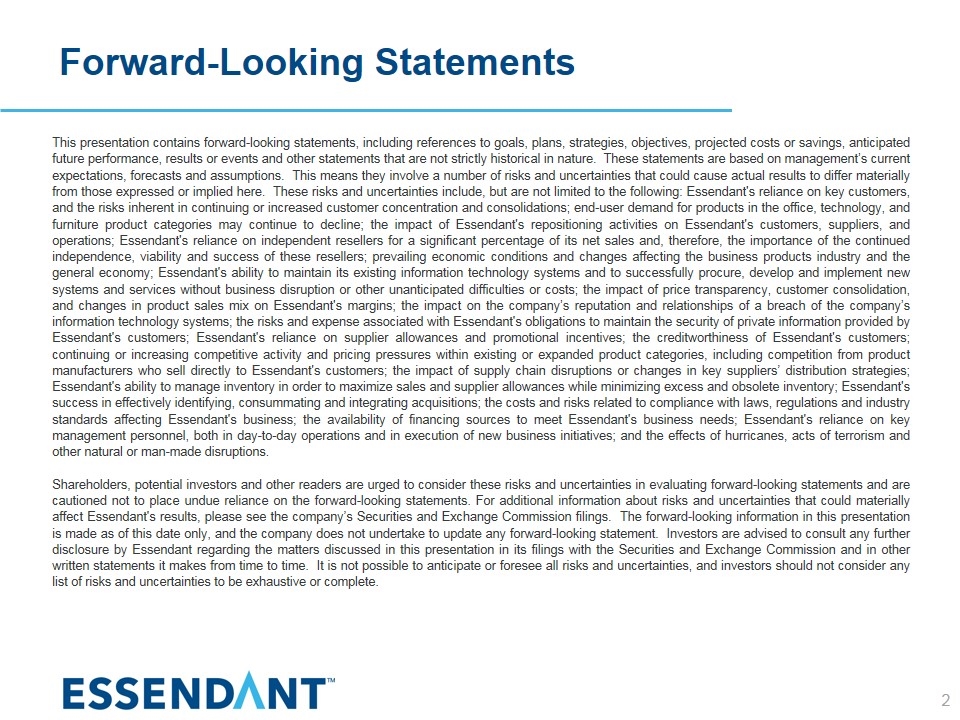
Forward-Looking Statements This presentation contains forward-looking statements, including references to goals, plans, strategies, objectives, projected costs or savings, anticipated future performance, results or events and other statements that are not strictly historical in nature. These statements are based on management’s current expectations, forecasts and assumptions. This means they involve a number of risks and uncertainties that could cause actual results to differ materially from those expressed or implied here. These risks and uncertainties include, but are not limited to the following: Essendant's reliance on key customers, and the risks inherent in continuing or increased customer concentration and consolidations; end-user demand for products in the office, technology, and furniture product categories may continue to decline; the impact of Essendant's repositioning activities on Essendant's customers, suppliers, and operations; Essendant's reliance on independent resellers for a significant percentage of its net sales and, therefore, the importance of the continued independence, viability and success of these resellers; prevailing economic conditions and changes affecting the business products industry and the general economy; Essendant's ability to maintain its existing information technology systems and to successfully procure, develop and implement new systems and services without business disruption or other unanticipated difficulties or costs; the impact of price transparency, customer consolidation, and changes in product sales mix on Essendant's margins; the impact on the company’s reputation and relationships of a breach of the company’s information technology systems; the risks and expense associated with Essendant's obligations to maintain the security of private information provided by Essendant's customers; Essendant's reliance on supplier allowances and promotional incentives; the creditworthiness of Essendant's customers; continuing or increasing competitive activity and pricing pressures within existing or expanded product categories, including competition from product manufacturers who sell directly to Essendant's customers; the impact of supply chain disruptions or changes in key suppliers’ distribution strategies; Essendant's ability to manage inventory in order to maximize sales and supplier allowances while minimizing excess and obsolete inventory; Essendant's success in effectively identifying, consummating and integrating acquisitions; the costs and risks related to compliance with laws, regulations and industry standards affecting Essendant's business; the availability of financing sources to meet Essendant's business needs; Essendant's reliance on key management personnel, both in day-to-day operations and in execution of new business initiatives; and the effects of hurricanes, acts of terrorism and other natural or man-made disruptions. Shareholders, potential investors and other readers are urged to consider these risks and uncertainties in evaluating forward-looking statements and are cautioned not to place undue reliance on the forward-looking statements. For additional information about risks and uncertainties that could materially affect Essendant's results, please see the company’s Securities and Exchange Commission filings. The forward-looking information in this presentation is made as of this date only, and the company does not undertake to update any forward-looking statement. Investors are advised to consult any further disclosure by Essendant regarding the matters discussed in this presentation in its filings with the Securities and Exchange Commission and in other written statements it makes from time to time. It is not possible to anticipate or foresee all risks and uncertainties, and investors should not consider any list of risks and uncertainties to be exhaustive or complete. 2
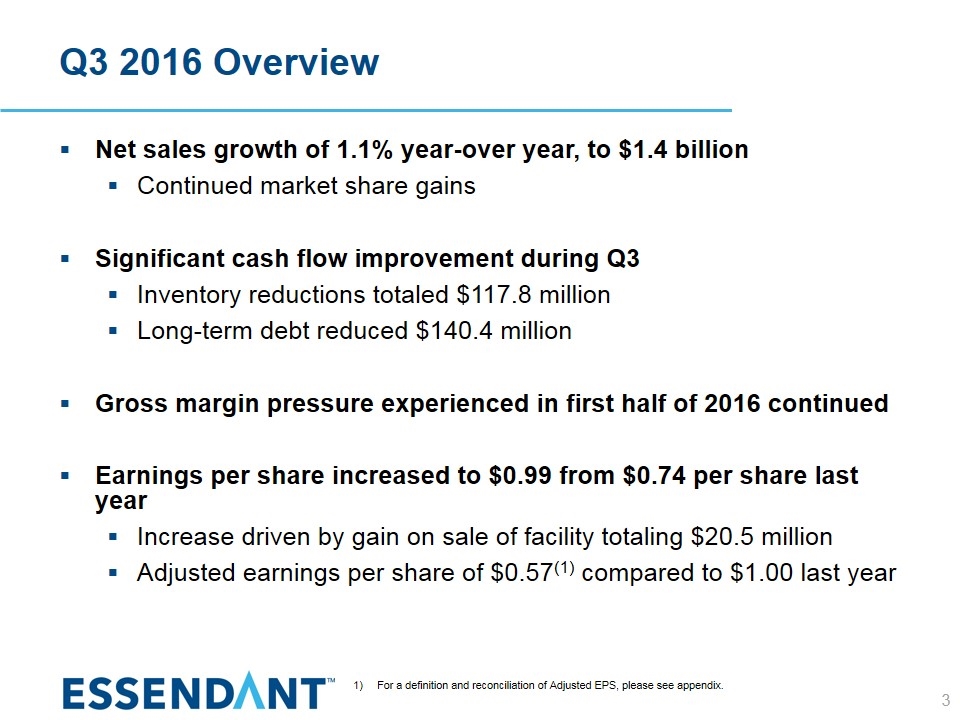
Q3 2016 Overview 3 Net sales growth of 1.1% year-over year, to $1.4 billion Continued market share gains Significant cash flow improvement during Q3 Inventory reductions totaled $117.8 million Long-term debt reduced $140.4 million Gross margin pressure experienced in first half of 2016 continued Earnings per share increased to $0.99 from $0.74 per share last year Increase driven by gain on sale of facility totaling $20.5 million Adjusted earnings per share of $0.57(1) compared to $1.00 last year For a definition and reconciliation of Adjusted EPS, please see appendix.
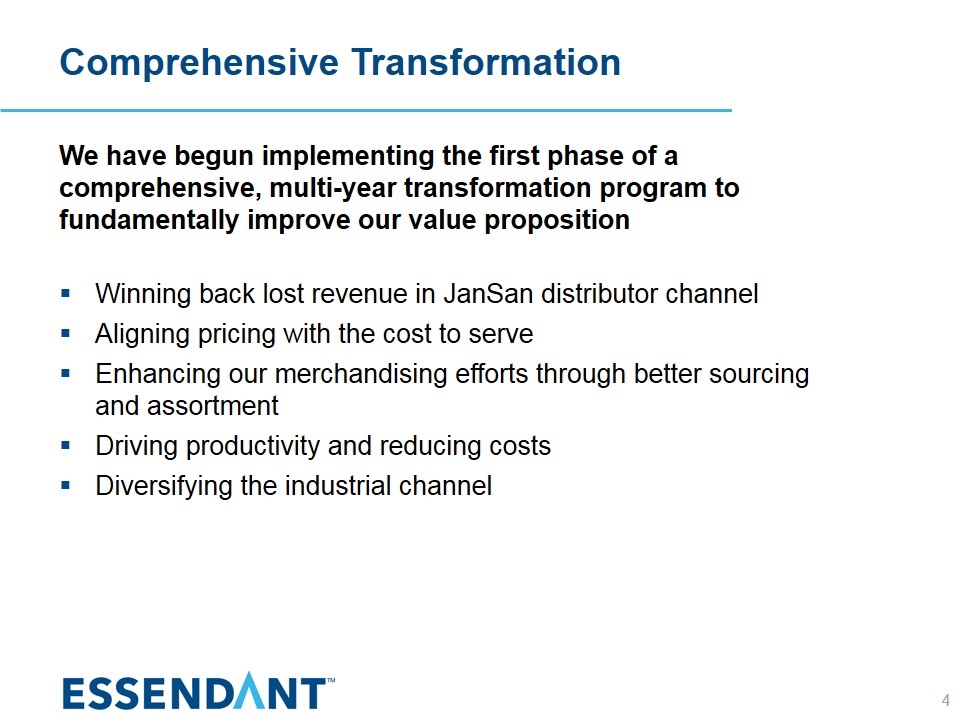
Comprehensive Transformation 4 We have begun implementing the first phase of a comprehensive, multi-year transformation program to fundamentally improve our value proposition Winning back lost revenue in JanSan distributor channel Aligning pricing with the cost to serve Enhancing our merchandising efforts through better sourcing and assortment Driving productivity and reducing costs Diversifying the industrial channel
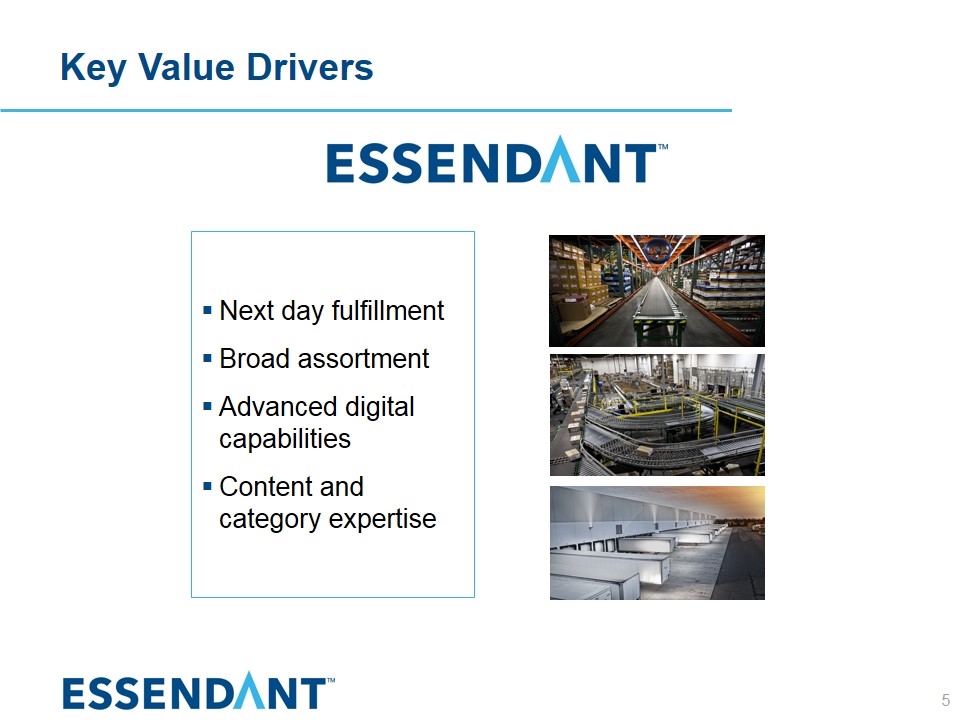
Key Value Drivers Next day fulfillment Broad assortment Advanced digital capabilities Content and category expertise 5
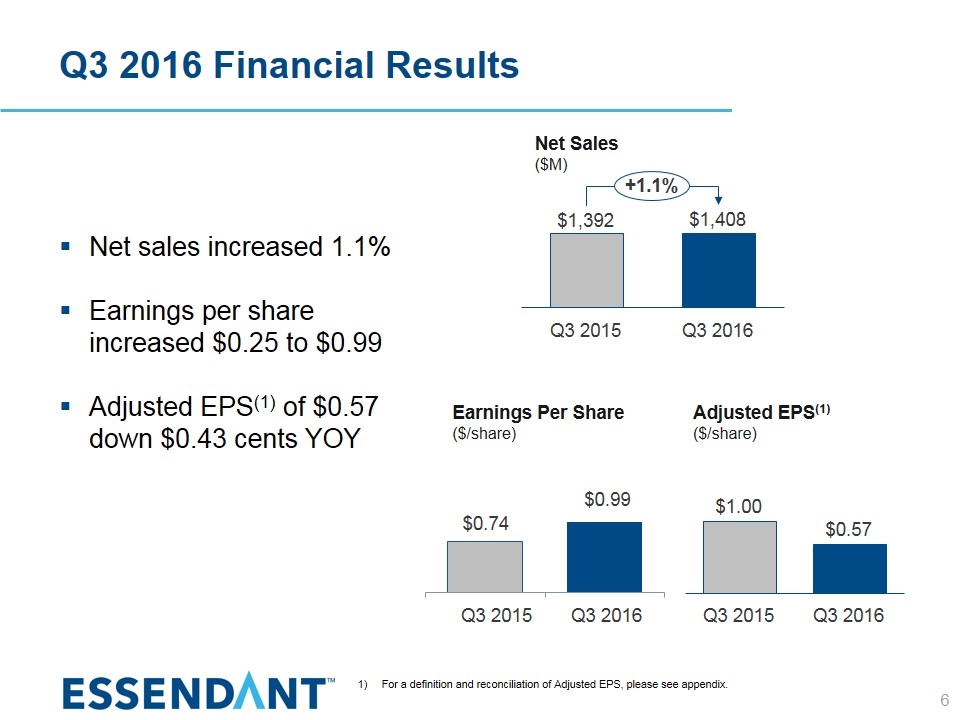
Q3 2016 Financial Results 6 Net sales increased 1.1% Earnings per share increased $0.25 to $0.99 Adjusted EPS(1) of $0.57 down $0.43 cents YOY Earnings Per Share ($/share) Adjusted EPS(1) ($/share) For a definition and reconciliation of Adjusted EPS, please see appendix. $1.00 Q3 2015 $0.57 Q3 2016 +1.1% Q3 2015 Q3 2016 $1,408 $1,392 Net Sales ($M) Q3 2016 Q3 2015 $0.99 $0.74
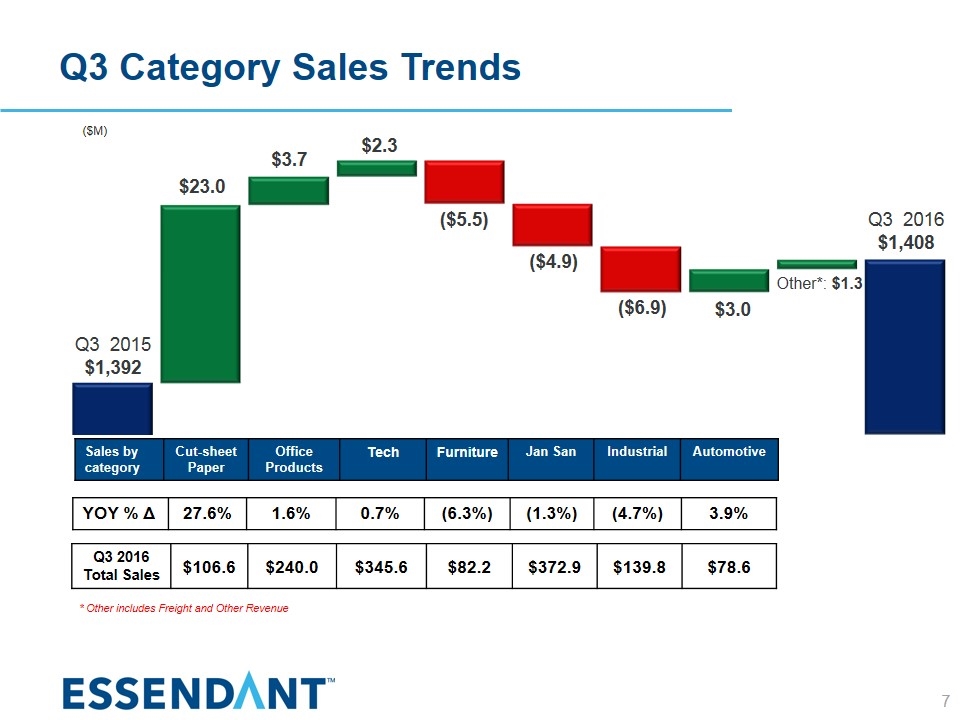
7 Q3 Category Sales Trends YOY % Δ 27.6% 1.6% 0.7% (6.3%) (1.3%) (4.7%) 3.9% Sales by category Cut-sheet Paper Office Products Tech Furniture Jan San Industrial Automotive Q3 2015 $1,392 $2.3 ($5.5) ($4.9) $23.0 ($6.9) $3.7 $3.0 Other*: $1.3 Q3 2016 $1,408 * Other includes Freight and Other Revenue ($M) Q3 2016 Total Sales $106.6 $240.0 $345.6 $82.2 $372.9 $139.8 $78.6
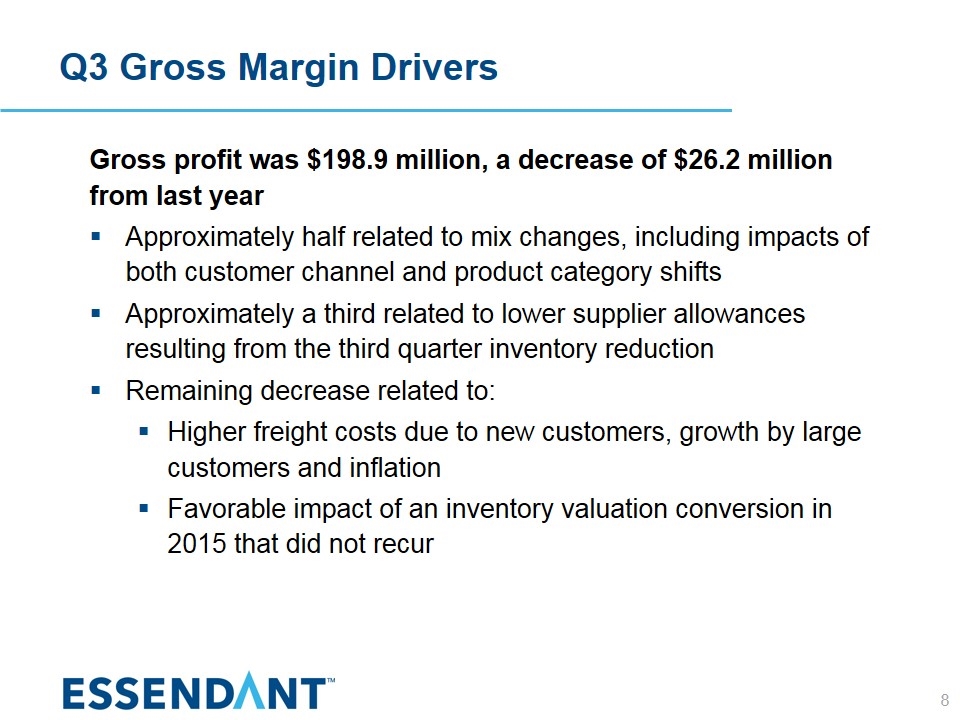
Q3 Gross Margin Drivers 8 ($13.5) Adj. $158.6 ($21.3) $138.5 Gross profit was $198.9 million, a decrease of $26.2 million from last year Approximately half related to mix changes, including impacts of both customer channel and product category shifts Approximately a third related to lower supplier allowances resulting from the third quarter inventory reduction Remaining decrease related to: Higher freight costs due to new customers, growth by large customers and inflation Favorable impact of an inventory valuation conversion in 2015 that did not recur
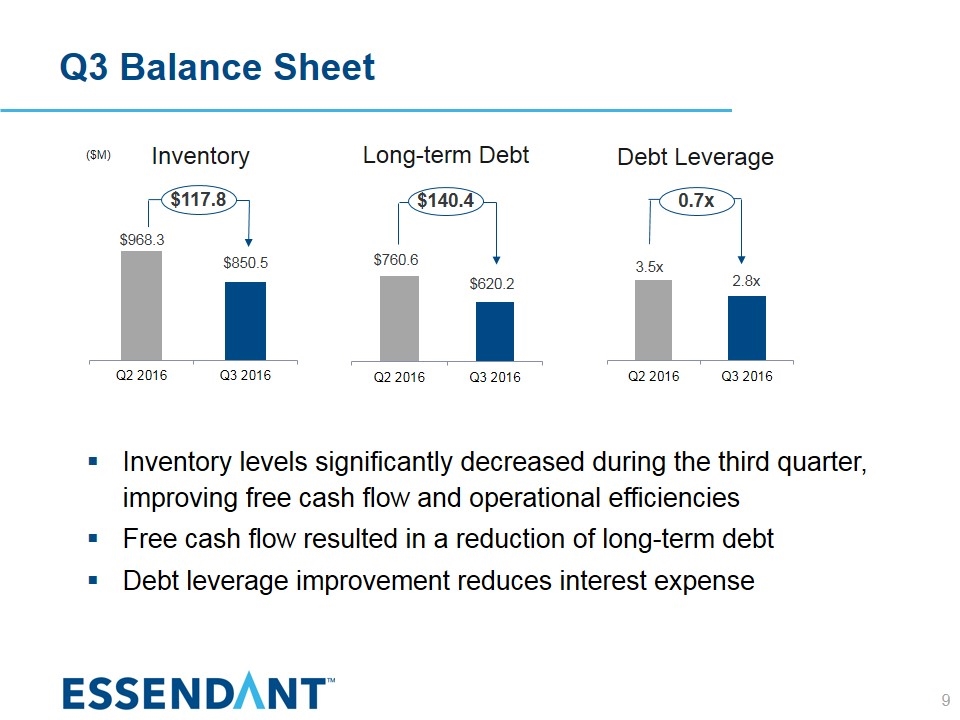
Q3 Balance Sheet 9 Inventory levels significantly decreased during the third quarter, improving free cash flow and operational efficiencies Free cash flow resulted in a reduction of long-term debt Debt leverage improvement reduces interest expense Inventory Long-term Debt Debt Leverage $117.8 $140.4 0.7x $968.3 $850.5 $760.6 $620.2 3.5x 2.8x ($M)
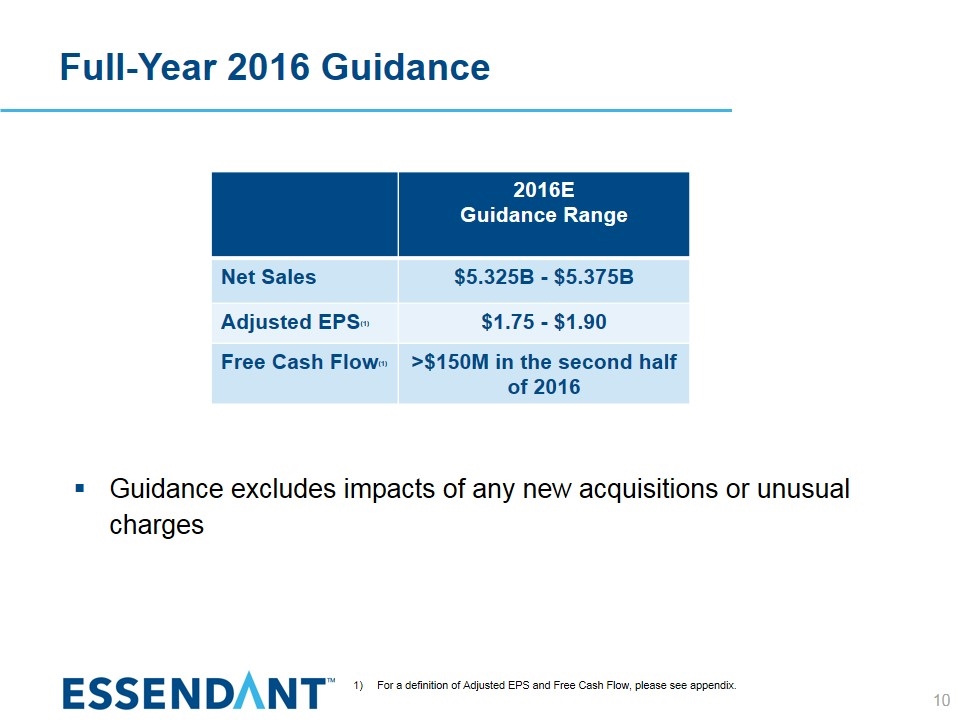
Full-Year 2016 Guidance Guidance excludes impacts of any new acquisitions or unusual charges 2016E Guidance Range Net Sales $5.325B - $5.375B Adjusted EPS(1) $1.75 - $1.90 Free Cash Flow(1) >$150M in the second half of 2016 10 For a definition of Adjusted EPS and Free Cash Flow, please see appendix.
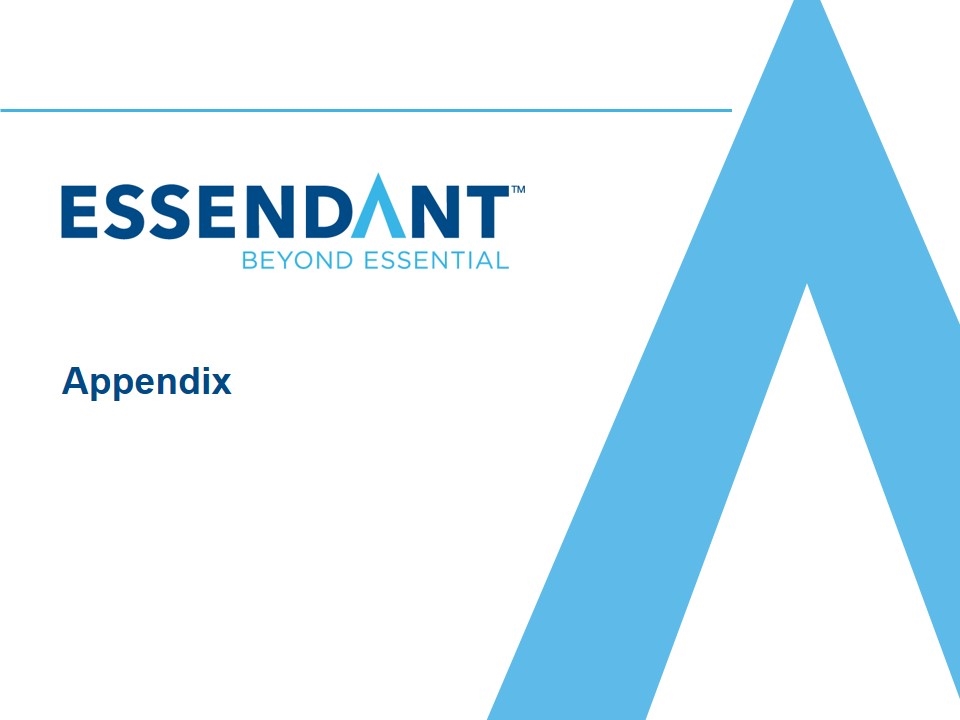
Appendix
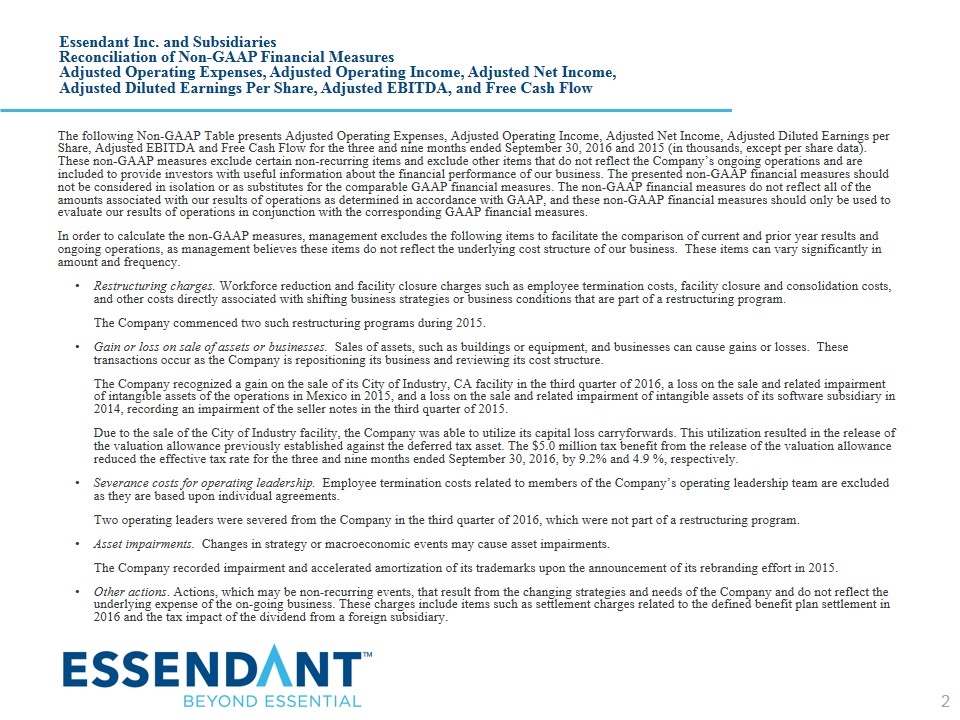
2 The following Non-GAAP Table presents Adjusted Operating Expenses, Adjusted Operating Income, Adjusted Net Income, Adjusted Diluted Earnings per Share, Adjusted EBITDA and Free Cash Flow for the three and nine months ended September 30, 2016 and 2015 (in thousands, except per share data). These non-GAAP measures exclude certain non-recurring items and exclude other items that do not reflect the Company’s ongoing operations and are included to provide investors with useful information about the financial performance of our business. The presented non-GAAP financial measures should not be considered in isolation or as substitutes for the comparable GAAP financial measures. The non-GAAP financial measures do not reflect all of the amounts associated with our results of operations as determined in accordance with GAAP, and these non-GAAP financial measures should only be used to evaluate our results of operations in conjunction with the corresponding GAAP financial measures. In order to calculate the non-GAAP measures, management excludes the following items to facilitate the comparison of current and prior year results and ongoing operations, as management believes these items do not reflect the underlying cost structure of our business. These items can vary significantly in amount and frequency. Restructuring charges. Workforce reduction and facility closure charges such as employee termination costs, facility closure and consolidation costs, and other costs directly associated with shifting business strategies or business conditions that are part of a restructuring program. The Company commenced two such restructuring programs during 2015. Gain or loss on sale of assets or businesses. Sales of assets, such as buildings or equipment, and businesses can cause gains or losses. These transactions occur as the Company is repositioning its business and reviewing its cost structure. The Company recognized a gain on the sale of its City of Industry, CA facility in the third quarter of 2016, a loss on the sale and related impairment of intangible assets of the operations in Mexico in 2015, and a loss on the sale and related impairment of intangible assets of its software subsidiary in 2014, recording an impairment of the seller notes in the third quarter of 2015. Due to the sale of the City of Industry facility, the Company was able to utilize its capital loss carryforwards. This utilization resulted in the release of the valuation allowance previously established against the deferred tax asset. The $5.0 million tax benefit from the release of the valuation allowance reduced the effective tax rate for the three and nine months ended September 30, 2016, by 9.2% and 4.9 %, respectively. Severance costs for operating leadership. Employee termination costs related to members of the Company’s operating leadership team are excluded as they are based upon individual agreements. Two operating leaders were severed from the Company in the third quarter of 2016, which were not part of a restructuring program. Asset impairments. Changes in strategy or macroeconomic events may cause asset impairments. The Company recorded impairment and accelerated amortization of its trademarks upon the announcement of its rebranding effort in 2015. Other actions. Actions, which may be non-recurring events, that result from the changing strategies and needs of the Company and do not reflect the underlying expense of the on-going business. These charges include items such as settlement charges related to the defined benefit plan settlement in 2016 and the tax impact of the dividend from a foreign subsidiary. Essendant Inc. and Subsidiaries Reconciliation of Non-GAAP Financial Measures Adjusted Operating Expenses, Adjusted Operating Income, Adjusted Net Income, Adjusted Diluted Earnings Per Share, Adjusted EBITDA, and Free Cash Flow
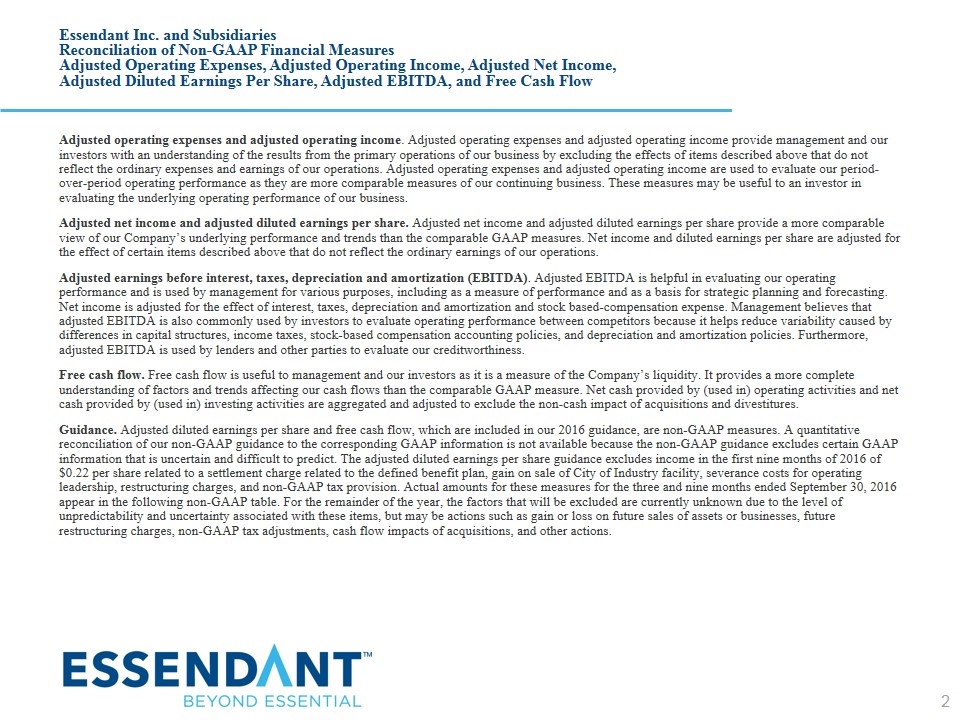
2 Adjusted operating expenses and adjusted operating income. Adjusted operating expenses and adjusted operating income provide management and our investors with an understanding of the results from the primary operations of our business by excluding the effects of items described above that do not reflect the ordinary expenses and earnings of our operations. Adjusted operating expenses and adjusted operating income are used to evaluate our period-over-period operating performance as they are more comparable measures of our continuing business. These measures may be useful to an investor in evaluating the underlying operating performance of our business. Adjusted net income and adjusted diluted earnings per share. Adjusted net income and adjusted diluted earnings per share provide a more comparable view of our Company’s underlying performance and trends than the comparable GAAP measures. Net income and diluted earnings per share are adjusted for the effect of certain items described above that do not reflect the ordinary earnings of our operations. Adjusted earnings before interest, taxes, depreciation and amortization (EBITDA). Adjusted EBITDA is helpful in evaluating our operating performance and is used by management for various purposes, including as a measure of performance and as a basis for strategic planning and forecasting. Net income is adjusted for the effect of interest, taxes, depreciation and amortization and stock based-compensation expense. Management believes that adjusted EBITDA is also commonly used by investors to evaluate operating performance between competitors because it helps reduce variability caused by differences in capital structures, income taxes, stock-based compensation accounting policies, and depreciation and amortization policies. Furthermore, adjusted EBITDA is used by lenders and other parties to evaluate our creditworthiness. Free cash flow. Free cash flow is useful to management and our investors as it is a measure of the Company’s liquidity. It provides a more complete understanding of factors and trends affecting our cash flows than the comparable GAAP measure. Net cash provided by (used in) operating activities and net cash provided by (used in) investing activities are aggregated and adjusted to exclude the non-cash impact of acquisitions and divestitures. Guidance. Adjusted diluted earnings per share and free cash flow, which are included in our 2016 guidance, are non-GAAP measures. A quantitative reconciliation of our non-GAAP guidance to the corresponding GAAP information is not available because the non-GAAP guidance excludes certain GAAP information that is uncertain and difficult to predict. The adjusted diluted earnings per share guidance excludes income in the first nine months of 2016 of $0.22 per share related to a settlement charge related to the defined benefit plan, gain on sale of City of Industry facility, severance costs for operating leadership, restructuring charges, and non-GAAP tax provision. Actual amounts for these measures for the three and nine months ended September 30, 2016 appear in the following non-GAAP table. For the remainder of the year, the factors that will be excluded are currently unknown due to the level of unpredictability and uncertainty associated with these items, but may be actions such as gain or loss on future sales of assets or businesses, future restructuring charges, non-GAAP tax adjustments, cash flow impacts of acquisitions, and other actions. Essendant Inc. and Subsidiaries Reconciliation of Non-GAAP Financial Measures Adjusted Operating Expenses, Adjusted Operating Income, Adjusted Net Income, Adjusted Diluted Earnings Per Share, Adjusted EBITDA, and Free Cash Flow
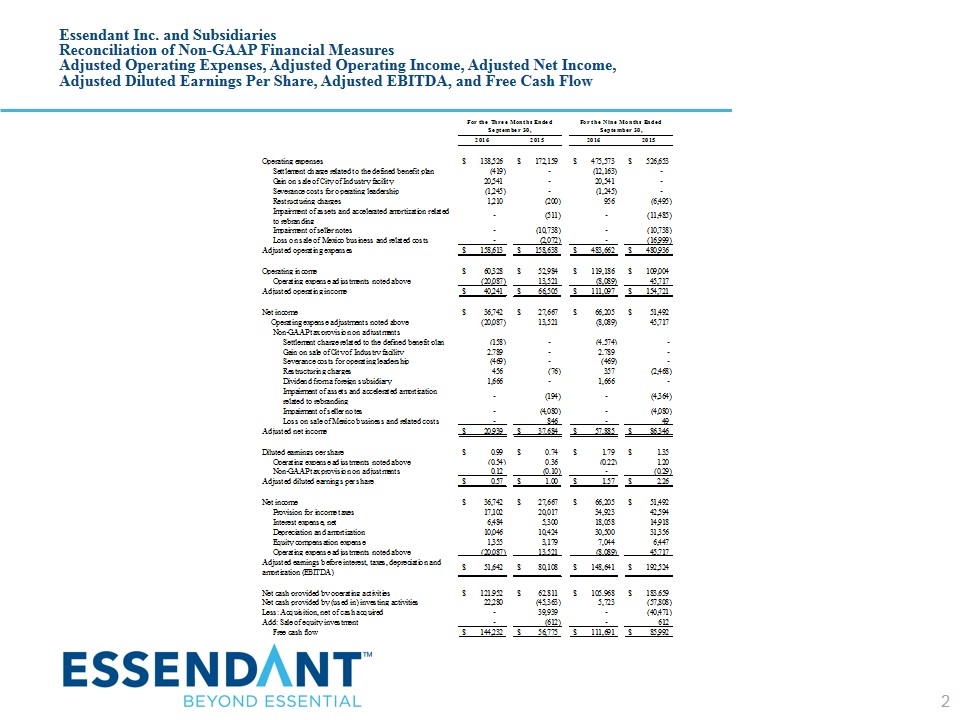
2 Essendant Inc. and Subsidiaries Reconciliation of Non-GAAP Financial Measures Adjusted Operating Expenses, Adjusted Operating Income, Adjusted Net Income, Adjusted Diluted Earnings Per Share, Adjusted EBITDA, and Free Cash Flow
